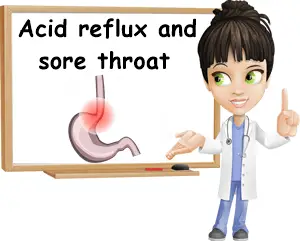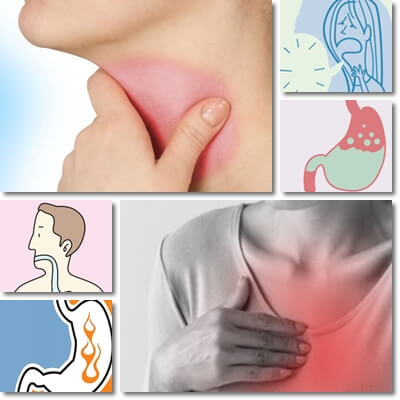Chronic cough and a resulting sore throat are common symptoms of acid reflux disease or GERD. Both are caused by gastric juices escaping the stomach and rising into the esophagus, the tube above the stomach. Being extremely acidic, the gastric juices basically burn through the sensitive esophagus lining creating irritation and inflammation that are almost immediately experienced in the form of heartburn and possibly also a bad, sour or acidic taste in the mouth. Over time, coughing and a sore throat from the acid reflux occur, with the cough becoming chronic in nature if the reflux is left untreated for too long.
Both the cough and the subsequent sore throat are not always associated with acid reflux by sufferers and so the condition may go untreated for long enough to produce serious damage to the esophagus. Over time, the damage to the esophagus lining causes changes at cellular level that create a predisposition for esophageal cancer, hence the importance of learning to recognize GERD symptoms and treating the acidity.

Essentially, acid reflux is a reflux of stomach contents consisting of both gastric juices and partially digested food particles that rise up into the esophagus. And because gastric juices are extremely acidic in nature, they eat away at the sensitive mucous lining of the esophagus, producing injury or damage. In more severe cases, stomach contents are downright regurgitated, meaning they flow back into the mouth. Such severe acid reflux not only produces extensive damage to sensitive mucous membranes along the way, but also some rather telling symptoms such as coughing, sore throat or hoarseness.
What does a sore throat from acid reflux look and feel like?
The back of the mouth looks red, inflamed and the throat feels swollen, scratchy, dry, hot or burning. There may be discomfort or pain, especially when swallowing food or fluids or trying to talk. Depending on the extent of the damage caused by the backflow of gastric juices, there may be a globus sensation, the persistent feeling of having something stuck in the throat, whether it feels like a pill or mucus, a lump or something else. By comparison, a sore throat from acid reflux does not have white spots or dots, but may present with white mucus produced in response to the erosion caused by the backflow of gastric juices. Mucus serves the purpose of protecting the throat lining from further damage and allowing it to heal.
Acid reflux sore throat and bad taste in the mouth
More severe forms of acid reflux cause you to downright regurgitate stomach contents, including gastric juices. On the one hand, these juices are naturally erosive and eat away at mucous membranes over time, causing heartburn and a sore throat – heartburn for when the esophagus is affected by contact with gastric juices and a sore throat for when the mucous membranes higher up are affected. On the other hand, being acidic, gastric juices taste really bad. So when stomach contents backflow into the mouth, you can actually taste them: a bad, metallic, acidic or sour, bitter taste. People with GERD often experience a similar bad taste in the mouth: metallic, acidic or sour, bitter.

Acid reflux sore throat and bad, smelly breath
Gastric juices are highly acidic. On the one hand, this makes them both taste and smell bad. On the other hand, they have a naturally erosive quality that causes them to eat away at sensitive mucous membranes (esophagus, pharynx) and even tooth enamel over time. Essentially, the bad breath can be caused directly by the bad smell of the stomach contents being regurgitated or indirectly by their effects on teeth. As they backflow into the mouth, the gastric juices themselves cause a bad taste and bad breath because they taste and smell bad: acidic, sour, metallic even. And then there’s also the effect on teeth: over time, gastric juices wear off tooth enamel which leaves teeth more exposed to bacteria that predispose to caries and tooth decay, indirectly causing bad breath.
What causes acid reflux?
1) Mechanical or physiological causes such as a hiatal hernia that causes the stomach to move up, above the diaphragm, predisposing to acid reflux.
2) Excess stomach acid production.
3) Long-term use of medication, especially anti-inflammatory medication.
4) Various conditions: pregnancy, obesity, auto-immune conditions.
5) Poor eating habits: eating fatty, fried foods, spicy foods, high-fiber foods, drinking carbonated beverages, alcohol, coffee etc.
6) Poor lifestyle choices: smoking, lying down after eating, eating large meals etc.
Acid reflux sore throat treatment
If you are looking how to soothe your sore throat after acid reflux, then absolutely avoid popular remedies such as vinegar, mustard, ginger or lemon juice. All of these remedies are either acidic or spicy and will only temporarily mask the throat burn from the acid reflux, not soothe it. In some instances, they may actually contribute to the irritation.
If you are looking for immediate relief for the throat burning sensation, then plain water is the best remedy. Drink room temperature water in small sips immediately after feeling the stomach contents flowing back up into the throat or mouth. Do not take large gulps of water at once or drink a whole bottle without breathing or your risk another reflux.
Another okay acid reflux sore throat treatment is sweet milk. If your throat is burning after having just experienced acid reflux, then you can enjoy relief from having small sips of sweet milk. Since it’s a fluid, it will help wash down the gastric juices, similar to water. But because it also has some fat, it have a soothing effect on the irritated and sore mucous membranes and extinguish the throat burn. Again, do not have too much or it will have the opposite effect.
If you are not allergic, it could help to have a little bit of honey every few hours to further soothe the throat. When I had gastritis, I also took Aloe vera on an empty stomach in the morning and found it soothes throat soreness, helps with repairing the damaged mucous membranes as well as regulates gastric acid production for less acid reflux. In my experience, it helps to not eat anything for a few hours after a more severe episode, or until you’re really hungry. This way the stomach has time to settle before you send it back at work digesting food.
But the best ways to soothe acid reflux throat soreness and burns is to manage the condition itself. Conventional treatment options for GERD include proton-pump inhibitors and antacids. However, lifestyle and dietary changes contribute just as much to actually treating GERD and preventing throat soreness and burns. Here are some helpful tips:
1) Eat little and often. Avoid large meals.
2) Sit upright, or better yet, walk for 30 minutes to an hour after eating.
Absolutely avoid lying down after eating (for at least 2-3 hours).
3) Avoid lifting heavy objects or exercising intensively right after eating (or for a couple of hours afterwards).
4) Maintain a healthy weight.
5) Do not smoke, do not drink alcohol.
6) Avoid coffee, caffeinated beverages, green and black tea and sodas and other carbonated beverages. At least until you’ve treated your GERD.
7) Avoid fatty foods, fried foods and all forms of processed foods.
8) Avoid trigger-foods.
Trigger-foods are foods that trigger acid reflux and cause throat soreness and burning sensation:
– spicy foods (pepper, ginger, turmeric, peppermint, horseradish, mustard)
– acidic foods (citrus fruits, vinegar, pickled vegetables and fruits, even tomatoes and their byproducts)
– fermented foods (acidic yogurts, buttermilk, soured milk, hard cheeses)
– onions, garlic, leek
– cabbage, cauliflower and other sulfurous cabbage family members
– heavy meats: cold meats, pork, game, beef, oily fish such as tuna or salmon
